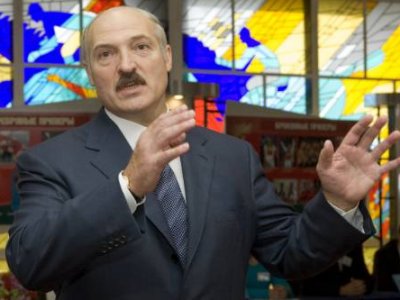 Belarussian President Alexander Lukashenko said on Friday he was pleased with the prospects offered by a European Union summit with six ex-Soviet republics even though he stayed away from the event.
Belarussian President Alexander Lukashenko said on Friday he was pleased with the prospects offered by a European Union summit with six ex-Soviet republics even though he stayed away from the event.
“Judging from the information I received, things ended up as we thought,” Lukashenko, quoted by the official BELTA news agency, told reporters on a trip to southern Belarus.
“We sell half our goods to the EU and we have to overcome duties and barriers. Doesn’t it make sense to fight for a free trade zone with the European Union?”
Lukashenko, accused for years of crushing fundamental rights, was given an invitation for Belarus to attend the Eastern Partnership summit in Prague, which launched a programme to ease rules on visas and strengthen energy and economic ties.
But he sent a deputy prime minister to Thursday’s meeting to avoid irritating some EU members, Czech diplomats said. Also invited were Armenia, Azerbaijan, Georgia, Moldova and Ukraine.
The EU last year suspended an entry ban on Lukashenko in response to the release of detainees it deemed political prisoners and the easing of restrictions on the media.
The president last week visited Rome and the Vatican, his first official trip to a Western country since the mid-1990s.
In his comments, Lukashenko praised Ukrainian President Viktor Yushchenko for helping smooth Belarus’s relations with the West. The presidents met on the eve of the Prague gathering.
“I spoke to (Yushchenko) not long ago about the Eastern Partnership summit and I thanked him for what he was doing to help build bridges between Belarus and the West,” BELTA quoted him as saying. “He carried out his promises in full.”
The EU has made the formal lifting of sanctions against Belarus contingent on further progress on democratisation.
But Lukashenko said human rights issues were unrelated to Belarus’s participation in the event.
“What do human rights have to do with oil or gas?” he said. “Who is against human rights in Belarus today? Of course, no one should view human rights as the right to smash shop windows or stir up unrest in the streets.”
Belarus’s liberal and nationalist opposition, divided between cooperating with authorities or opposing them, welcomed the Prague summit in principle. Most activists did not see the EU invitation to Belarus as a victory for the president.
 Eurasia Press & News
Eurasia Press & News
